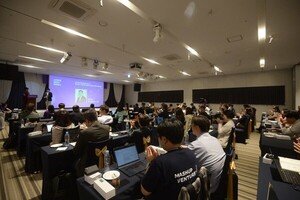
Recently, Korean startups that have grown primarily in the domestic market have been actively expanding overseas, so members of the startup ecosystem, including startup support organizations and venture capitalists (VCs), gathered to explore strategies for Korean startups to expand overseas.
The Startup Alliance, a public-private partnership network for startup companies in Korea, held the Startup Ecosystem Conference 2024 at the Venetian Hotel & Resort in Yeosu, Jeollanam-do on June 20.
The Startup Ecosystem Conference, which has been held since 2015, is a large-scale networking event attended by government agencies, venture capitalists, accelerators, and large companies that support the growth of startups. It is held in different locations every year to stimulate the local startup ecosystem, and this year it was held in Yeosu, which has successfully hosted the World Expo in the past.
The theme of this year’s Startup Ecosystem Conference is the globalization of Korea’s startup ecosystem. According to “Startup Korea 2023,” a survey on the global openness of Korea’s startup ecosystem, only 7% of Korean startups expanded overseas in 2022. In contrast, global startup leaders Singapore and Israel accounted for 90% and 80%, respectively.
The event explored the global expansion strategies of Korea’s startup ecosystem and focused on the current state of the startup ecosystems in Japan, the Middle East and Southeast Asia, and how to enter local markets.
First, participants argued that corporate venture capital (CVC) plays an important role in the globalization of Korean startups. CVC firms are VC firms established by companies in line with their business strategies, unlike general VC firms whose goal is to maximize financial profits.
“CVC companies of major corporate groups such as Hyundai, Samsung, GS, and CJ have some of the largest networks,” said Park Young-hoon, CEO of d-camp and former vice president of GS Retail. “CVC companies that have engaged in open innovation with startups can play a major role in supporting the business growth of startups based on their global networks and capabilities.”
Han Tae-sik, an economic policy researcher at LG Business Research, said it is also important to consider the impact that global geopolitical issues such as the US-China conflict, war and the US presidential election will have on the startup ecosystem.
“Large corporations are incorporating geopolitical issues into their business strategies, and the startup ecosystems in the U.S. and Europe are beginning to take similar issues into account,” Han said. “But startups that lead technology innovation are not affected by geopolitical issues, so this will be an opportunity, not a crisis.”
There were also opinions that Korean startups should use Japan as a bridgehead for expanding into the world. Global Brain CEO Lee Kyung-hoon said, “ChannelTalk is a prime example. The company found product-market fit (PMF) in Korea, increased sales in Japan, and then expanded globally. There will be opportunities in large markets similar to Korea, such as commerce, entertainment, and software as a service (SaaS).”
Another recommendation is to expand into the Middle East: “For the next 10 years, focus on Saudi Arabia and the UAE, which are investing heavily, and for the next 10 years, focus on Egypt and Pakistan, which have young populations,” said Shin Yu-geun of Shorouk Partners, based in the UAE capital, Abu Dhabi.
“It is difficult for foreign companies to enter the Middle East and there are many cases of foreign companies competing with each other to acquire Middle Eastern companies, such as Uber’s acquisition of Middle Eastern car-sharing company Careem. However, with the local stock market growing rapidly, we will see more initial public offerings (IPOs) in the future,” Singh added.
“Many Korean startups entered Southeast Asia without a plan, prior analysis or sufficient funding,” said Wong De Loo, CEO of Singapore-based startup consultancy Wilt Venture Builders. “They now need to tailor their strategies to local conditions, including tailoring strategies for each country and industry,” he added.

